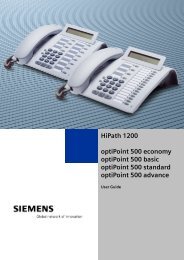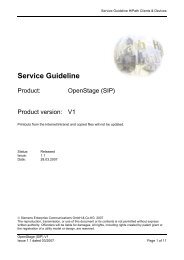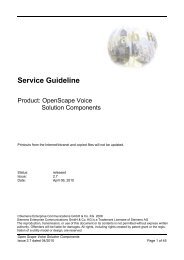- Page 1 and 2:
Administration HiPath 3000/5000 V7
- Page 3 and 4:
3000sbTOC.fm For internal use only
- Page 5 and 6:
3000sbTOC.fm For internal use only
- Page 7 and 8:
3000sbTOC.fm For internal use only
- Page 9 and 10:
3000sbTOC.fm For internal use only
- Page 11 and 12:
3000sbTOC.fm For internal use only
- Page 13 and 14:
3000sbTOC.fm For internal use only
- Page 15 and 16:
3000sb1.fm For internal use only In
- Page 17 and 18:
3000sb1.fm For internal use only In
- Page 19 and 20:
3000sb1.fm For internal use only In
- Page 21 and 22:
3000sb1.fm For internal use only In
- Page 23 and 24:
3000sb1.fm For internal use only In
- Page 25 and 26:
3000sb1.fm For internal use only In
- Page 27 and 28:
3000sb1.fm For internal use only In
- Page 29 and 30:
3000sb1.fm For internal use only In
- Page 31 and 32:
3000sb1.fm For internal use only In
- Page 33 and 34:
3000sb1.fm For internal use only In
- Page 35 and 36:
3000sb1.fm For internal use only In
- Page 37 and 38:
3000sb1.fm For internal use only In
- Page 39 and 40:
3000sb1.fm For internal use only In
- Page 41 and 42:
3000sb1.fm For internal use only In
- Page 43 and 44:
3000sb1.fm For internal use only In
- Page 45 and 46:
3000sb1.fm For internal use only In
- Page 47 and 48:
3000sb1.fm For internal use only In
- Page 49 and 50:
3000sb1.fm For internal use only In
- Page 51 and 52:
3000sb1.fm For internal use only In
- Page 53 and 54:
3000sb1.fm For internal use only In
- Page 55 and 56:
3000sb1.fm For internal use only In
- Page 57 and 58:
3000sb1.fm For internal use only In
- Page 59 and 60:
3000sb2.fm For internal use only Hi
- Page 61 and 62:
3000sb2.fm For internal use only Hi
- Page 63 and 64:
3000sb2.fm For internal use only Hi
- Page 65 and 66:
3000sb2.fm For internal use only Hi
- Page 67 and 68:
3000sb2.fm For internal use only Hi
- Page 69 and 70:
3000sb2.fm For internal use only Hi
- Page 71 and 72:
3000sb2.fm For internal use only Hi
- Page 73 and 74:
3000sb2.fm For internal use only Hi
- Page 75 and 76:
3000sb2.fm For internal use only Hi
- Page 77 and 78:
3000sb2.fm For internal use only Hi
- Page 79 and 80:
3000sb2.fm For internal use only Hi
- Page 81 and 82:
3000sb2.fm For internal use only Hi
- Page 83 and 84:
3000sb2.fm For internal use only Hi
- Page 85 and 86:
3000sb2.fm For internal use only Hi
- Page 87 and 88:
3000sb2.fm For internal use only Hi
- Page 89 and 90:
3000sb2.fm For internal use only Hi
- Page 91 and 92:
3000sb2.fm For internal use only Hi
- Page 93 and 94:
3000sb2.fm For internal use only Hi
- Page 95 and 96:
3000sb2.fm For internal use only Hi
- Page 97 and 98:
3000sb2.fm For internal use only Hi
- Page 99 and 100:
3000sb2.fm For internal use only Hi
- Page 101 and 102:
3000sb2.fm For internal use only Hi
- Page 103 and 104:
3000sb2.fm For internal use only Hi
- Page 105 and 106:
3000sb2.fm For internal use only Hi
- Page 107 and 108:
3000sb2.fm For internal use only Hi
- Page 109 and 110:
3000sb2.fm For internal use only Hi
- Page 111 and 112:
3000sb2.fm For internal use only Hi
- Page 113 and 114:
3000sb2.fm For internal use only Hi
- Page 115 and 116:
3000sb2.fm For internal use only Hi
- Page 117 and 118:
3000sb2.fm For internal use only Hi
- Page 119 and 120:
3000sb2.fm For internal use only Hi
- Page 121 and 122:
3000sb2.fm For internal use only Hi
- Page 123 and 124:
3000sb2.fm For internal use only Hi
- Page 125 and 126:
3000sb2.fm For internal use only Hi
- Page 127 and 128:
3000sb2.fm For internal use only Hi
- Page 129 and 130:
3000sb2.fm For internal use only Hi
- Page 131 and 132:
3000sb2.fm For internal use only Hi
- Page 133 and 134:
3000sb2.fm For internal use only Hi
- Page 135 and 136:
3000sb2.fm For internal use only Hi
- Page 137 and 138:
3000sb2.fm For internal use only Hi
- Page 139 and 140:
3000sb2.fm For internal use only Hi
- Page 141 and 142: 3000sb2.fm For internal use only Hi
- Page 143 and 144: 3000sb2.fm For internal use only Hi
- Page 145 and 146: 3000sb2.fm For internal use only Hi
- Page 147 and 148: 3000sb2.fm For internal use only Hi
- Page 149 and 150: 3000sb2.fm For internal use only Hi
- Page 151 and 152: 3000sb2.fm For internal use only Hi
- Page 153 and 154: 3000sb2.fm For internal use only Hi
- Page 155 and 156: 3000sb2.fm For internal use only Hi
- Page 157 and 158: 3000sb3.fm For internal use only Hi
- Page 159 and 160: 3000sb3.fm For internal use only Hi
- Page 161 and 162: 3000sb3.fm For internal use only Hi
- Page 163 and 164: 3000sb3.fm For internal use only Hi
- Page 165 and 166: 3000sb3.fm For internal use only Hi
- Page 167 and 168: 3000sb3.fm For internal use only Hi
- Page 169 and 170: 3000sb3.fm For internal use only Hi
- Page 171 and 172: 3000sb3.fm For internal use only Hi
- Page 173 and 174: 3000sb4.fm For internal use only Hi
- Page 175 and 176: 3000sb4.fm For internal use only Hi
- Page 177 and 178: 3000sb4.fm For internal use only Hi
- Page 179 and 180: 3000sb4.fm For internal use only Hi
- Page 181 and 182: 3000sb4.fm For internal use only Hi
- Page 183 and 184: 3000sb4.fm For internal use only Hi
- Page 185 and 186: 3000sb4.fm For internal use only Hi
- Page 187 and 188: 3000sb4.fm For internal use only Hi
- Page 189 and 190: 3000sb4.fm For internal use only Hi
- Page 191: 3000sb4.fm For internal use only Hi
- Page 195 and 196: 3000sb4.fm For internal use only Hi
- Page 197 and 198: 3000sb4.fm For internal use only Hi
- Page 199 and 200: 3000sb4.fm For internal use only Hi
- Page 201 and 202: 3000sb4.fm For internal use only Hi
- Page 203 and 204: 3000sb4.fm For internal use only Hi
- Page 205 and 206: 3000sb4.fm For internal use only Hi
- Page 207 and 208: 3000sb4.fm For internal use only Hi
- Page 209 and 210: 3000sb4.fm For internal use only Hi
- Page 211 and 212: 3000sb4.fm For internal use only Hi
- Page 213 and 214: 3000sb4.fm For internal use only Hi
- Page 215 and 216: 3000sb4.fm For internal use only Hi
- Page 217 and 218: 3000sb4.fm For internal use only Hi
- Page 219 and 220: 3000sb4.fm For internal use only Hi
- Page 221 and 222: 3000sb4.fm For internal use only Hi
- Page 223 and 224: 3000sb4.fm For internal use only Hi
- Page 225 and 226: 3000sb4.fm For internal use only Hi
- Page 227 and 228: 3000sb4.fm For internal use only Hi
- Page 229 and 230: 3000sb4.fm For internal use only Hi
- Page 231 and 232: 3000sb4.fm For internal use only Hi
- Page 233 and 234: 3000sb4.fm For internal use only Hi
- Page 235 and 236: 3000sb4.fm For internal use only Hi
- Page 237 and 238: 3000sb4.fm For internal use only Hi
- Page 239 and 240: 3000sb4.fm For internal use only Hi
- Page 241 and 242: 3000sb4.fm For internal use only Hi
- Page 243 and 244:
3000sb4.fm For internal use only Hi
- Page 245 and 246:
3000sb4.fm For internal use only Hi
- Page 247 and 248:
3000sb4.fm For internal use only Hi
- Page 249 and 250:
3000sb4.fm For internal use only Hi
- Page 251 and 252:
3000sb4.fm For internal use only Hi
- Page 253 and 254:
3000sb4.fm For internal use only Hi
- Page 255 and 256:
3000sb4.fm For internal use only Hi
- Page 257 and 258:
3000sb4.fm For internal use only Hi
- Page 259 and 260:
3000sb4.fm For internal use only Hi
- Page 261 and 262:
3000sb4.fm For internal use only Hi
- Page 263 and 264:
3000sb4.fm For internal use only Hi
- Page 265 and 266:
3000sb4.fm For internal use only Hi
- Page 267 and 268:
3000sb4.fm For internal use only Hi
- Page 269 and 270:
3000sb4.fm For internal use only Hi
- Page 271 and 272:
3000sb4.fm For internal use only Hi
- Page 273 and 274:
3000sb5.fm For internal use only Se
- Page 275 and 276:
3000sb5.fm For internal use only Se
- Page 277 and 278:
3000sb5.fm For internal use only Se
- Page 279 and 280:
3000sb5.fm For internal use only Se
- Page 281 and 282:
3000sb5.fm For internal use only Se
- Page 283 and 284:
3000sb5.fm For internal use only Se
- Page 285 and 286:
3000sb5.fm For internal use only Se
- Page 287 and 288:
3000sb5.fm For internal use only Se
- Page 289 and 290:
3000sb5.fm For internal use only Se
- Page 291 and 292:
3000sb5.fm For internal use only Se
- Page 293 and 294:
3000sb5.fm For internal use only Se
- Page 295 and 296:
3000sb5.fm For internal use only Se
- Page 297 and 298:
3000sb5.fm For internal use only Se
- Page 299 and 300:
3000sb5.fm For internal use only Se
- Page 301 and 302:
3000sb5.fm For internal use only Se
- Page 303 and 304:
3000sb5.fm For internal use only Se
- Page 305 and 306:
3000sb5.fm For internal use only Se
- Page 307 and 308:
3000sb5.fm For internal use only Se
- Page 309 and 310:
3000sb5.fm For internal use only Se
- Page 311 and 312:
3000sb5.fm For internal use only Se
- Page 313 and 314:
3000sb5.fm For internal use only Se
- Page 315 and 316:
3000sb5.fm For internal use only Se
- Page 317 and 318:
3000sb6.fm For internal use only Mi
- Page 319 and 320:
3000sb6.fm For internal use only Mi
- Page 321 and 322:
3000sb6.fm For internal use only Mi
- Page 323 and 324:
3000sb6.fm For internal use only Mi
- Page 325 and 326:
3000sb6.fm For internal use only Mi
- Page 327 and 328:
3000sb6.fm For internal use only Mi
- Page 329 and 330:
3000sb55.fm For internal use only A
- Page 331 and 332:
3000sb7.fm For internal use only Wo
- Page 333 and 334:
3000sb7.fm For internal use only Wo
- Page 335 and 336:
3000sb7.fm For internal use only Wo
- Page 337 and 338:
3000sb7.fm For internal use only Wo
- Page 339 and 340:
3000sb7.fm For internal use only Wo
- Page 341 and 342:
3000sb7.fm For internal use only Wo
- Page 343 and 344:
3000sb7.fm For internal use only Wo
- Page 345 and 346:
3000sb7.fm For internal use only Wo
- Page 347 and 348:
3000sb7.fm For internal use only Wo
- Page 349 and 350:
3000sb7.fm For internal use only Wo
- Page 351 and 352:
3000sb7.fm For internal use only Wo
- Page 353 and 354:
3000sb7.fm For internal use only Wo
- Page 355 and 356:
3000sb7.fm For internal use only Wo
- Page 357 and 358:
3000sb7.fm For internal use only Wo
- Page 359 and 360:
3000sb7.fm For internal use only Wo
- Page 361 and 362:
3000sb7.fm For internal use only Wo
- Page 363 and 364:
3000sb7.fm For internal use only Wo
- Page 365 and 366:
3000sb7.fm For internal use only Wo
- Page 367 and 368:
3000sb7.fm For internal use only Wo
- Page 369 and 370:
3000sb7.fm For internal use only Wo
- Page 371 and 372:
3000sb7.fm For internal use only Wo
- Page 373 and 374:
3000sb7.fm For internal use only Wo
- Page 375 and 376:
3000sb7.fm For internal use only Wo
- Page 377 and 378:
3000sb7.fm For internal use only Wo
- Page 379 and 380:
3000sb7.fm For internal use only Wo
- Page 381 and 382:
3000sb7.fm For internal use only Wo
- Page 383 and 384:
3000sb7.fm For internal use only Wo
- Page 385 and 386:
3000sb7.fm For internal use only Wo
- Page 387 and 388:
3000sb7.fm For internal use only Wo
- Page 389 and 390:
3000sb7.fm For internal use only Wo
- Page 391 and 392:
3000sb7.fm For internal use only Wo
- Page 393 and 394:
3000sb7.fm For internal use only Wo
- Page 395 and 396:
3000sb7.fm For internal use only Wo
- Page 397 and 398:
3000sb7.fm For internal use only Wo
- Page 399 and 400:
3000sb7.fm For internal use only Wo
- Page 401 and 402:
3000sb7.fm For internal use only Wo
- Page 403 and 404:
3000sb7.fm For internal use only Wo
- Page 405 and 406:
3000sb7.fm For internal use only Wo
- Page 407 and 408:
3000sb7.fm For internal use only Wo
- Page 409 and 410:
3000sb7.fm For internal use only Wo
- Page 411 and 412:
3000sb7.fm For internal use only Wo
- Page 413 and 414:
3000sb7.fm For internal use only Wo
- Page 415 and 416:
3000sb7.fm For internal use only Wo
- Page 417 and 418:
3000sb7.fm For internal use only Wo
- Page 419 and 420:
3000sb7.fm For internal use only Wo
- Page 421 and 422:
3000sb7.fm For internal use only Wo
- Page 423 and 424:
3000sb7.fm For internal use only Wo
- Page 425 and 426:
3000sb7.fm For internal use only Wo
- Page 427 and 428:
3000sb7.fm For internal use only Wo
- Page 429 and 430:
3000sb7.fm For internal use only Wo
- Page 431 and 432:
3000sb7.fm For internal use only Wo
- Page 433 and 434:
3000sb7.fm For internal use only Wo
- Page 435 and 436:
3000sb7.fm For internal use only Wo
- Page 437 and 438:
3000sb7.fm For internal use only Wo
- Page 439 and 440:
3000sb7.fm For internal use only Wo
- Page 441 and 442:
3000sb7.fm For internal use only Wo
- Page 443 and 444:
3000sb7.fm For internal use only Wo
- Page 445 and 446:
3000sb7.fm For internal use only Wo
- Page 447 and 448:
3000sb7.fm For internal use only Wo
- Page 449 and 450:
3000sb8.fm For internal use only Ap
- Page 451 and 452:
3000sb8.fm For internal use only Ap
- Page 453 and 454:
3000sb8.fm For internal use only Ap
- Page 455 and 456:
3000sb8.fm For internal use only Ap
- Page 457 and 458:
3000sb8.fm For internal use only Ap
- Page 459 and 460:
3000sb8.fm For internal use only Ap
- Page 461 and 462:
3000sb8.fm For internal use only Ap
- Page 463 and 464:
3000sb8.fm For internal use only Ap
- Page 465 and 466:
3000sb8.fm For internal use only Ap
- Page 467 and 468:
3000sb8.fm For internal use only Ap
- Page 469 and 470:
3000sb8.fm For internal use only Ap
- Page 471 and 472:
3000sb8.fm For internal use only Ap
- Page 473 and 474:
3000sb8.fm For internal use only Ap
- Page 475 and 476:
3000sb8.fm For internal use only Ap
- Page 477 and 478:
3000sb8.fm For internal use only Ap
- Page 479 and 480:
3000sb8.fm For internal use only Ap
- Page 481 and 482:
3000sb9.fm For internal use only Ca
- Page 483 and 484:
3000sb9.fm For internal use only Ca
- Page 485 and 486:
3000sb9.fm For internal use only Ca
- Page 487 and 488:
3000sb9.fm For internal use only Ca
- Page 489 and 490:
3000sb9.fm For internal use only Ca
- Page 491 and 492:
3000sb9.fm For internal use only Ca
- Page 493 and 494:
3000sb9.fm For internal use only Ca
- Page 495 and 496:
3000sb9.fm For internal use only Ca
- Page 497 and 498:
3000sb9.fm For internal use only Ca
- Page 499 and 500:
3000sb10.fm For internal use only O
- Page 501 and 502:
3000sb11.fm For internal use only I
- Page 503 and 504:
3000sb11.fm For internal use only I
- Page 505 and 506:
3000sb11.fm For internal use only I
- Page 507 and 508:
3000sb11.fm For internal use only I
- Page 509 and 510:
3000sb11.fm For internal use only I
- Page 511 and 512:
3000sb11.fm For internal use only I
- Page 513 and 514:
3000sb11.fm For internal use only I
- Page 515 and 516:
3000sb11.fm For internal use only I
- Page 517 and 518:
3000sb11.fm For internal use only I
- Page 519 and 520:
3000sbIX.fm For internal use only I
- Page 521 and 522:
3000sbIX.fm For internal use only I
- Page 523 and 524:
3000sbIX.fm For internal use only I
- Page 525 and 526:
3000sbIX.fm For internal use only I





